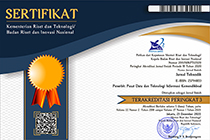EVALUASI PENYELENGGARAAN UJIAN SEMESTER BERBASIS KOMPUTER (USBK) MENGGUNAKAN MODEL CIPP
DOI:
https://doi.org/10.32550/teknodik.v0i2.519Keywords:
Evaluasi Program, CIPP, USBKAbstract
Tujuan penelitian ini adalah mengevaluasi program penyelenggaran ujian semester berbasis komputer (USBK) yang sesuai dengan program kerja kepala sekolah urusan kurikulum. Penelitian ini merupakan penelitian evaluasi dengan model CIPP. Pengumpulan data menggunakan teknik observasi, angket, dan wawancara. Teknik analisis yang digunakan adalah deskriptif kualitatif dan kuantitatif. Hasil penelitian menunjukkan bahwa: (1) pelaksanaan ujian semester berbasis komputer di SMK Al Munawwariyyah pada ujian semester gasal 2017/2018 secara umum berjalan baik dengan presentase ketercapaian 77,8%. Pada aspek proses terdapat kendala dalam administrasi server dan jaringan sehingga perlu dilakukan optimalisasi program komputer yang digunakan. (2) Tanggapan guru terhadap pelaksanaan ujian berbasis komputer adalah sekitar 88,9% guru memperoleh manfaat dari program ujian berbasis komputer karena dapat mempercepat proses koreksi dan analisis butir soal, terutama untuk menentukan butir soal mana yang berkategori mudah, sedang, dan susah bagi siswa. Dengan hasil analisis tersebut guru dapat dengan cepat memberikan feedback kepada siswa melalui remidi. Tanggapan siswa terhadap pelaksanaan ujian semester berbasis komputer adalah 44,5% siswa semakin giat belajar, 66,6% siswa menginginkan ujian berbasis komputer dilanjutkan dan lebih disempurnakan. Dilihat dari penyelenggaraan, ujian semester berbasis komputer mampu menghemat dana hingga 40,0% dibandingkan ujian semester menggunakan kertas.
The purpose of this study was to evaluate the program for holding a computer-based semester exam that is in accordance with the principal's work program on curriculum matters. This research is evaluation research with the CIPP model. Data collection uses observation techniques, questionnaires, and interviews. The analysis technique used is descriptive qualitative and quantitative. The results showed that: (1) the implementation of computer-based semester exams at Al Munawwariyyah Vocational School on the 2017/2018 odd semester exam generally went well with a percentage achievement of 77.8%. In the process aspect, there are obstacles in server and network administration so it is necessary to optimize the computer programs used. (2) The teacher's response to the implementation of computer-based examinations is that 88.9% of teachers benefit from computer-based examination programs because they can speed up the process of correction and analysis of items, especially to determine which items are easy, moderate, and difficult for students. With the results of the analysis, the teacher can quickly provide feedback to students through remedies. The students' response to the implementation of computer-based semester exams was 44.5% of students increasingly active in learning, 66.6% of students wanted computer-based exams to be continued and more refined. Judging from the implementation, computer-based semester exams can save funds up to 40.0% compared to semester exams using paper.
References
Buku
Arikunto, S. (2010). Prosedur Penelitian Suatu Pendekatan Praktik. Jakarta: Rineka Cipta.
Brown, G. T. (2016). Improvement and Accountability Functions of Assessment: Impact on Teachers’ Thinking and Action. In M. A. Peters, Encyclopedia of Educational Philosophy and Theory. Singapore: Springer.
Mustofa, Z. (2019a). Panduan Membangun E-Learning di Kelas. Jombang: Kun Fayakun.
Stefflebeam, D. L., & Coryn, C. L. (2014). Evaluation Theory, Models, and Applications. USA: Jossey-Bass.
Jurnal/Prosiding
Darma, I. K. (2019). The effectiveness of teaching program of CIPP evaluation model . International Research Journal of Engineering, IT & Scientific Research 5 (3), 1-13.
Douglas, T., Salter, S., Iglesias, M., Dowlman, M., & Eri, R. (2016). The feedback process: Perspectives of first andsecond year undergraduate students in thedisciplines of education, health science and nursing. Journal of University Teaching & Learning Practice 13 (1), 1-19.
Earl, K., & Giles, D. (2011). An-other Look at Assessment: Assessment in Learning. New Zealand Journal of Teachers' Work 8 (1), 11-20.
Khodijah, N. (2012). Evaluasi Program Peningkatan Kualifikasi Guru Madrasah di Sumatera Selatan. Jurnal Penelitian dan Evaluasi Pendidikan 16 (1), 348-364.
Mahmudi, I. (2011). CIPP: Suatu Model Evaluasi Program Pendidikan. At-Ta'dib 6 (1), 111-125.
Mustofa, Z. (2019b). Pengaruh Discovery Learning Berbantuan E-Learning dalam Meningkatkan Penguasaan Konsep dan Aplikasinya. Kwangsan: Jurnal Teknologi Pendidikan, 7(1), 14–29.
Raihany, A. (2014). The Importance of Teacher's Written Feedback on The Students' Writting in Teaching Learning Process. OKARA 1 (9), 91-106.
Sadler, D. R. (2012). Assessment, evaluation and quality assurance:Implications for integrity in reporting academic achievement in higher education. Education Inquiry 3 (2), 201-216.
Wahyuni, V., Kartono, & Susiloningsih, E. (2018). Development of Project Assessment Instruments to Assess Mathematical Problem Solving Skills on A Project-Based Learning. Journal of Educational Research and Evaluation 7 (2), 147-153.
Yang, Y., Aalst, J. V., Chan, C. K., & Tian, W. (2016). Reflective assessment in knowledge building by students with low academic achievement. International Journal of Computer-Supported Collaborative Learning 11, 281-311.
Lain-Lain
Mendikbud. (2016). Permendikbud Nomor 23 Tentang Standar Penilaian Pendidikan. Jakarta: Kemdikbud
Mendikbud. (2017). Permendikbud Nomor 3 Tentang Penilaian Hasil Belajar oleh Pemerintah dan Penilaian Hasil Belajar oleh Satuan Pendidikan. Jakarta: Kemdikbud.
William, D. (2013). Assessment: The Bridge between Teaching and Learning. Voices from the Middle 21 (2), 15-20.
Downloads
Published
How to Cite
Issue
Section
Citation Check
License
Please download and complete the Form, Copyright Transfer, and Ethics Statement Form. The following is provided at the time of submitting the text (Upload Additional Files):









